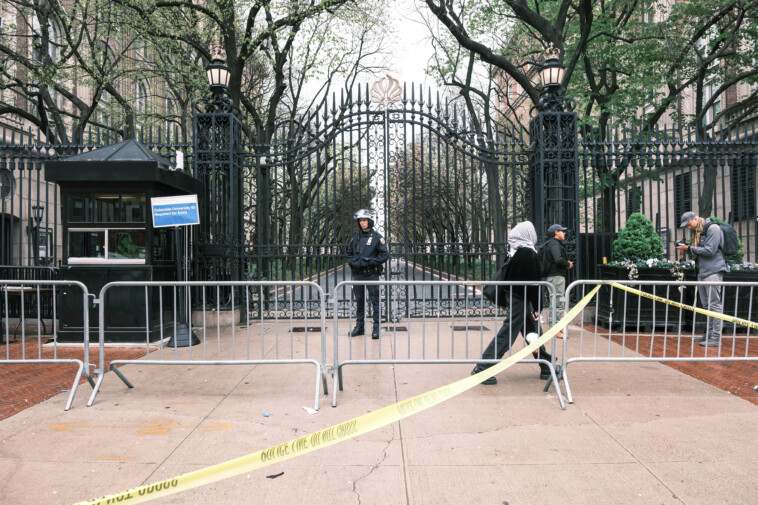The Big Apple is backing Columbia University in its war to keep its gates shut.
Attorneys for the city said the Ivy League school should be allowed to block the public from a beloved community space on its Morningside Heights campus — after outraged locals sued to get access.
“This has always been private property,” Rachel Moston, senior counsel for the city Law Department, argued in court this week.
At the heart of the legal battle is College Walk, a once bustling footpath on West 116th Street that allows pedestrians to cut across the school’s campus instead of being forced to walk around the six blocks that Columbia takes up.
Members of the Morningside Heights Community Coalition are fuming over Columbia’s decision to close the gates to the walkway — a closure that went into effect during last year’s chaotic student protests over the Israel-Hamas war.
“It’s been a great public space,” Dave Robinson, the neighborhood group’s president, told The Post.
“It really enriches the lives of the students [and] it enriches the lives of people in the community to have those interactions,” Robinson said. “Our kids played on the campus. After-school groups come there.
“It’s been a very important public space for people who live in the community – and that’s sort of obscured by the arguments about safety, which safety is important, but it’s not the only thing.”
The closure only permits those with a valid Columbia ID to enter the main campus, which extends from West 114th to West 120th streets. Locals can apply for a pass, but the disgruntled neighbors argue it’s a convoluted process for aging seniors and leads to long wait times and congestion on the street.
After submitting petitions and an open letter demanding the reopening of the campus to the public, Morningside Heights resident Philippe Auffray – alongside three other gray-haired locals – sued the university in January, The Post previously reported.
“[Columbia] is part of the community – they’re not the community,” Auffray told The Post, adding that his 97-year-old mother can no longer go about her daily activities since the closure.
“Anyone who is trying to go to the subway or to the buses, all those people are being disenfranchised, and it just shows that Columbia is a bad neighbor.”
Among the locals’ arguments is that the stretch of quad space on West 116th Street was intended to remain public after the city sold it to the private institution decades ago.
Columbia — which is believed to be the largest private landowner in the Big Apple — reportedly paid the city $1,000 in 1953 to take over the stretch of West 116th Street.
The deal mandated an “easement over a proposed pedestrian walk to be constructed by the university,” according to a City Planning Commission report from that year.
The language of the city’s agreement – particularly whether the “pedestrian walk” is public, or private, property – was at the center of oral arguments for Auffray’s case in Manhattan Supreme Court on Tuesday.
Attorneys for Columbia pointed out that the section of West 116th Street between Broadway and Amsterdam Avenue doesn’t even exist as a road on city maps — and the campus has closed without issue for graduations and other instances, such as the Sept. 1, 2001, terror attacks, without issue.
“In a perfect world, we’d all like to return to pre-Oct. 7, 2023, but that’s not the world we live in today,” an attorney for Columbia said in court.
“The university is trying its best to move in that direction.”
Even Moston, the city’s lawyer, agreed, telling the court the easement simply grants the city the ability to make hydrant and manhole repairs.
But Toby Golick, the attorney for the plaintiffs, had a vastly different interpretation of the city’s agreement with the elite institution — and argued there would have been massive community opposition at the time if the deal really allowed the portion of West 116th Street to be converted into a private passage.
The agreement “unambiguously creates a pedestrian easement,” Golick said, adding that closing off the campus to the public creates a “burden on the community [that] is very significant.”
Golick recounted horror stories from the cases’ three other senior plaintiffs, including 92-year-old Barbara Griffiths’ longer trips to the grocery store and how Mary Allen, 86, had lost a “lifeline” to the rest of her community.
“[Allen] loved to just sit there and watch the students, there’s often rehearsals and parents with their toddlers, it was a lively place,” Golick previously told The Post. “And now it’s sort of a dead place.”
Judge David Cohen, who denied the plaintiffs’ request to temporarily re-open the gates Tuesday as the case progresses, concluded there were “valid arguments on both sides and neither side carries the day.”
The school’s motion to dismiss the case will be heard next month.
Columbia first closed campus access to the public after an Oct. 7, 2023, protest and again last April — and has kept its gates shut, despite a September notice from the school saying it anticipated them to reopen in a “matter of weeks, not months.”
“The University evaluates Morningside campus access on an ongoing basis,” a rep from Columbia told The Post.
“In response to input from many stakeholders, in February we implemented changes to access protocols that streamline access for alumni, our Morningside Heights and West Harlem neighbors, family of faculty, and university guests,” the statement said. “We continue to communicate regularly with our neighbors and the local community regarding these and other modifications to campus access.”
Still, members of the Morningside Heights Community Coalition said Columbia has created a barrier for the community, and wrongfully shuttered a treasured space enjoyed by children and seniors alike.
“Aside from any legal consideration, this is a moral and community-centered issue,” said Dan McSweeney, a resident of West 111th Street who is part of the local group.
“This is ridiculous and it’s not making anyone safer,” he told The Post. “It’s causing a lot of problems – not only for older people, but disabled people or anybody who lives across the avenue. Why should that be the case if this has been a publicly accessible walkway for over 70 years?”








